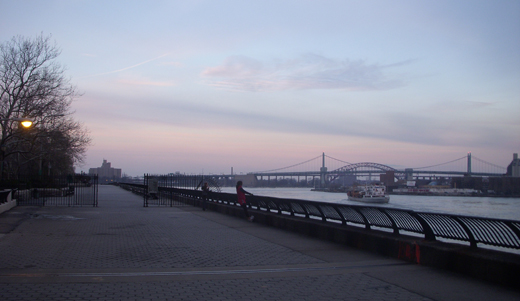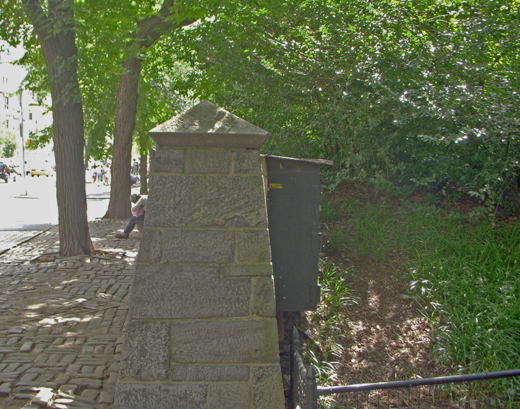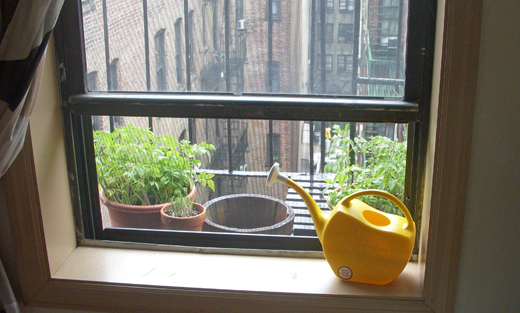
First, a word about the crap in front of the breakfront. The cute boxes with the ribbons contain a number of smaller pieces of silver that probably ought to be given away. (Wouldn’t you like some?) Beneath the skirted footstool lies the household supply of soft drinks (Kathleen does not believe in ice). On top of the boxes, a serving dish sits beneath a cunning screened dome, designed to keep insects away from outdoor treats. (I don’t need it at all, but I can’t get rid of it. Perhaps this photograph will shame me into taking action.)
Second, a word about the crap in the breakfront. You can’t really see it, but I want you to know that it’s all on the way out — either to the hutch on the balcony or to HousingWorks.
Third, a word about the pile of crap to the left of the breakfront: history in the making — if you know what I mean by “history.”
***
Aside from half an hour at the beginning of the day and another half hour at the end, I spent all of Friday with Quatorze. We were to meet at the Orpheum in time for the ten o’clock showing of The Informant!, but when I crossed Second Avenue, there he was, early as usual, killing time by walking an extra block that he would only have to backtrack. I don’t know who is going to win this particular war. Will Quatorze shame me into being as ahead-of-time as he is? I used to feel ashamed, and rightly so, because I used to be late. But now I am punctual and Quatorze is early. I’d much rather hang out at home until the last minute than spend extra time at the Orpheum, wondering if the projectionist will ever get round to starting the feature. As long as I’m not late, I’m not keeping anybody waiting — technically. But I feel ashamed of being the second person of two to show up.
After the movie, we had lunch next door, at Burger Heaven. This wasn’t to be one of our leisurely lunches, because we had a job to do. Quatorze wanted to know if the top of the breakfront/secretary desk could be detached from the bottom. We would discover that it can, thanks to Quatorze’s knowledge of furniture construction, nimbleness with tools, and heroic determination. We would detach the upper, glass-fronted part of the breakfront from the lower part. Then Quatorze would convince me that the best place for the upper part, right now, is right where it was. We settled it on the dowels that projected from the lower part. The screws went into a ziploc bag.
We learned that the bottom has no top. When you take the upper part of the breakfront away, you see a lot of struts and braces, and some very fresh-looking mahogany, but no surface — and, thanks to those dowels, no easy way to improvise one. The plan is to have a top made — Quatorze recurs to the manmade composite known as “quartz” — and to put the glass-fronted top, which needs expensive repairs, in storage. That I should even think of removing the top is a sign of how profoundly my regard for old-timey possessions has shifted. I have resigned my position as curator of childhood dreams.
We’ll discuss the whys and wherefores some other time. Right now, it’s enough to say that, after the successful detachment of the piece’s two halves, I had to figure out what do with the contents, which ocvered almost every surface in the living room. I not only did the figuring out, but IÂ went to the store and bought provisions for an impromptu dinner party. Discretion forbids my enumerating the guests, but Quatorze and Fossil Darling were of the party, which wouldn’t have taken place without Quatorze’s incredibly savvy assistance. Knowing Quatorze as I do, I have no business saying “incredibly,” but I claim poetic license.
***
We all had a great evening, and nobody stayed up too late. But I was shocked to be reminded by Fossil, when we talked the next morning at around noon, that I’d agreed to cross town for dinner at Shun Lee West. It was the last thing I wanted to do, if only because it involved leaving the building and crossing a street. Many streets! But one street was too many. Among the consequences of having a great time with friends the night before was the fierce desire to see nobody the morning after.
I went about my usual Saturday business, listening to opera and tidying the apartment. (I also ran two dishwasher loads.) But I never went for five minutes without worrying about dinner. Should I cancel? I wanted to cancel, but I was also suspicious of this desire. Why did I want to stay home on a Saturday night, cleaning out the refrigerator, when I could be enjoying Peking duck at Shun Lee West? And don’t give me that crap about how hard it is to get from Yorkville to Lincoln Center.
All afternoon this went on. Should I cancel? Or should I just go? And, if I decided to cancel, when should I tell Fossil Darling? What was the latest polite moment for letting him know that the reservation ought to be changed? Six o’clock, I decided.
There was so much that I wanted to do at home! After tidying the rooms, and cleaning out the refrigerator, I planned to go through the mail. (A three-foot stack! Okay, mostly catalogues.) Then I would assemble a couple of cool new playlists. The gernaiums would be dead-headed! And maybe, if I was really dutiful, I’d write up a page or two for Portico.
The urge to write was kindled by Eric Patton’s latest entry at SORE AFRAID. On the eve of his fortieth birthday, Eric has been writing poignantly about the passage of time and the disappointment of early dreams, usually without calling attention it, but occasionally unfurling a banner:
We headed out to the Teas. They were not very crowded. I decided that I really liked the Madonna song of the summer, although the lyrics seemed to be mocking me on such a sad day. Everybody wants to party with you? It’s a celebration? No more.
The wistfulness intensified with each parting ferry. I wanted to stand atop the day and yell “stop”!
The last statement is truly worthy of Wallace Stevens, don’t you think? All right, it’s a tad emphatic. But when I read Eric’s entries, I feel that I’m reading Proust in English for the first time. My desire to encourage Eric is not unencumbered by the fanciful idea that, someday, readers might think of Marcel as the French Patton. But genug schon with the mash notes.  That the scene of Eric’s elegizing is Fire Island Pines simply ups the poignancy. I think: nearly thirty years ago, when I was not quite ten years younger than Eric is now, I drank even more deeply of the draught of Piney nostalgia. At the end of the summer of 1981, I did not tell myself that it was the end of the summer of 1981. What I told myself was that I should never be back. If I ever set foot on the dock by the Boatel and the Pavilion and the Miramar again, it wouldn’t be for many, many years; and, in fact, it has not yet happened.
What I learned in the Pines in 1981, at the beginning of the life in New York City that I had dreamed about since my childhood — a mere sixteen miles from Times Square and more dozens of layers of social awareness than I could count — was that familiarity, for me, would lead to unhappiness. If I ate the cookies that movies and magazines had made so attractive and appetizing, I’d always know where I was, but where I’d be would be in misery. I decided, that summer, against being miserable. The alternative was: difficulty. I settled on figuring things out for myself. It was not necessarily an intelligent to do. If the Internet had not been made available to civilians, I’d be worrying about mildew on the monarda, and wishing more than anything else that my lupines would prosper. I don’t regret my stint as a gardener in Litchfield County (all right, New Milford). But the idea that I should find satisfaction in the health of a bed of plants makes me laugh now. I’m not that good man.
***
Between five and six, I slowly ran out of steam. It also happened that, minutes after the stroke of six, I finished the apartment-tidying. I put the vacuum cleaner and the Pledge Clean away, and threw the dustrags in the laundry. I could call Fossil — or I could stop whining and just go, like a grown-up. Let me tell you: being me wasn’t fun! Then the complexion of the matter underwent a hormonal change.
It took, I should say, five or six seconds. Earlier, I’d thought about walking over to Fossil’s apartment before dinner. How virtuous would that be!
Even more: how solitary. But this scheme was premised on the idea that I would put off the Saturday housekeeping until Sunday, and spend the day either following through on the myriad projects that detaching the top of the breakfront inaugurated (I’ll spare you the list) or reading Chris Wickham’s riveting book about the early Middle Ages: a day of bourgeois Talmud. But now that it was six, and I had spent hours on my feet, dusting and vacuuming, I was hardly keen on more exercise. And yet, within those five or six seconds, it became the thing that I wanted more than anything else. I showered and dressed with the haste of someone who had just received a coveted invitation. As I did, I thought of this passage in Joseph O’Neill’s Netherland.Â
There followed as pause during which, I decided, this woman was considering the retrospective significance of a taxi journey up the Edgware Road many years ago. Her hand made its way up to my thigh and tenderly applied pressure there. “Anyhow, I think that’s why I trust you,” she said, her nearest eye darting at me and then back at the ceiling. “Because you were a complete gentleman.” The phrase made her laugh loudly, and she began to make a lesiurely, more sensual motion with her hand. I reached out to touch her breasts, and it asonished me how much pleasure this gave me. Suddenly, in spite of all the notions with which I’d dismissed the possibility, this woman had my attention. I was fully alert now and fully aware of her particularity. Â
I was fully aware of a desire to be out on the street, walking through the beautiful twilight toward Lincoln Center. The fear of getting mixed up, yet again, on the far side of the Sheep Meadow was just the right kind of bother. I’d figure out when to stop heading toward the towers of the Time Warner Center, even if it did mean traipsing through the Tavern on the Green’s parking lot. I’d step into an elevator and ride the nineteen floors to Fossil’s feeling as solid as mortal man can feel. Oblivious of all the crap.Â






















